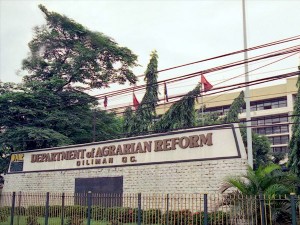MANILA, Philippines—More than 200 farmers from Nueva Ecija and Nueva Vizcaya have graduated from the “Farm Business School” of the Department of Agrarian Reform, a DAR official said Tuesday.
From July to November last year, the farmers covered by the government’s Comprehensive Agrarian Reform Program were taught modern farming practices and basic business concepts in once-a-week, half-day sessions, according to the DAR.
“The school trained them on business techniques so they can properly manage their produce and agri-products as it goes out in the market,” DAR Regional Director Marjorie Alzate said in a news release.
The aim is to teach agrarian reform beneficiaries (ARBs) “not only the modern and proper ways of farming but also in improving their knowledge in business,” she said.
The farmers formally graduated from the program in a ceremony last month, the DAR said.
The Farm Business School (FBS) was established last year by the DAR, the United Nations Food and Agricultural Organization (FAO), and Agricultural Training Institute of the Department of Agriculture.
Alzate said the farmers were taught bookkeeping, cash flows, market surveys, review and selling products, costing and labor and proper packaging of their products.
Heiko Bammann, a representative from FAO headquarters in Rome, was present at the graduation of the first batch of farmers under the FBS program.
“The most important is that you can stand up and speak up to your buyers. Now that your knowledge on business is broadened and you speak the language, you can now set-up and negotiate much better,” said Bammann.
FAO specialist Gomer Tumbali said he believed the farmers would greatly benefit from applying what they learned in the next cropping season.
He said that the marketing skills taught to the farmers plus their lessons on product packaging would help in adding quality to their products and most importantly, attract more buyers.
According to Alzate, the agrarian reform beneficiaries are set to continue with regular discussions and forums even after finishing the FBS program to further improve their farm management skills and knowledge.
The second batch of farmer-students is scheduled to start with the FBS in April in Nueva Vizcaya, the DAR said.
The DAR shouldered the training expenses of the farmer-students, including tuition and teacher fees, while FAO and DA-ATI provided the trainers and teachers.
Classes are held in the barangays once a week for half a day.
The project cost for the first batch of graduates amounted to almost P300,000, according to the DAR.
RELATED STORIES
Group alarmed by lack of support services for land reform
Aquino kin got P167M in ‘interest’
DAR denies overpayment for Hacienda Luisita
